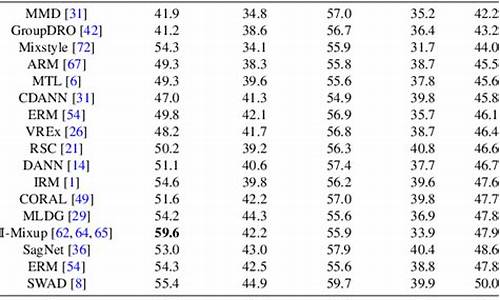terraincognita_TERRAINCOGNITA什么意思
今天,我将与大家共同探讨terraincognita的今日更新,希望我的介绍能为有需要的朋友提供一些参考和建议。
1.TERRA是什么意思
2.set out是什么意思
3.有没有《The Author's Account of Himself (作者自叙)》的译文?
4.terra incognita是什么意思

TERRA是什么意思
terra
incognita
[英][?ter?
in?k?ɡnit?][美][?t?r?
nkɑɡ?nit?]
n.
<拉>未发现的地域,(知识上的)未知领域;
双语例句
1
this
is
terra
incognita.
this
is
alien.
这是一片未知领域.这是外星生物.
set out是什么意思
Australia, officially the Commonwealth of Australia, is a country in the Southern Hemisphere comprising the mainland of the world's smallest continent and a number of islands in the Southern, Indian, and Pacific Oceans. Neighbouring countries include Indonesia, East Timor and Papua New Guinea to the north, the Solomon Islands, Vanuatu and the French dependency of New Caledonia to the northeast, and New Zealand to the southeast.
The mainland of Australia has been inhabited for more than 42,000 years by Indigenous Australians. After sporadic visits by fishermen from the north and by European explorers and merchants starting in the seventeenth century, the eastern half of the mainland was claimed by the British in 1770 and officially settled through penal transportation as the colony of New South Wales on 26 January 1788. As the population grew and new areas were explored, another five largely self-governing Crown Colonies were successively established over the course of the 19th century.
On 1 January 1901, the six colonies became a Federation, and the Commonwealth of Australia was formed. Since federation, Australia has maintained a stable liberal democratic political system and remains a Commonwealth Realm. The capital city is Canberra, located in the Australian Capital Territory. The current national population is around 20.6 million people, and is concentrated mainly in the large coastal cities of Sydney, Melbourne, Brisbane, Perth, and Adelaide.
Etymology
View of Port Jackson, the site where Sydney was established, taken from the South Head. (From A Voyage to Terra Australis.)The name "Australia" is derived from the Latin Australis, meaning of the South. Legends of an "unknown land of the south" (terra australis incognita) dating back to Roman times were commonplace in medi?val geography, but they were not based on any actual knowledge of the continent. The Dutch adjectival form Australische was used by Dutch officials in Batavia to refer to the newly discovered land to the south as early as 1638. The first use of the word "Australia" in the English language was a 1693 translation of Les Aventures de Jacques Sadeur dans la Découverte et le Voyage de la Terre Australe, a 1692 French novel by Gabriel de Foigny under the pen name Jacques Sadeur.[1] Alexander Dalrymple then used it in An Historical Collection of Voyages and Discoveries in the South Pacific Ocean (1771), to refer to the entire South Pacific region. In 1793, George Shaw and Sir James Smith published Zoology and Botany of New Holland, in which they wrote of "the vast island, or rather continent, of Australia, Australasia or New Holland."
The name "Australia" was popularised by the 1814 work A Voyage to Terra Australis by the navigator Matthew Flinders, who was the first recorded person to circumnavigate Australia. Despite its title, which reflected the view of the British Admiralty, Flinders used the word "Australia" in the book, which was widely read and gave the term general currency. Governor Lachlan Macquarie of New South Wales subsequently used the word in his dispatches to England. In 1817, he recommended that it be officially adopted. In 1824, the Admiralty agreed that the continent should be known officially as Australia.
The word "Australia" in Australian English is pronounced as /?.?st.lj?/, /?.?st.li?.?/ or /?.?st.j?/.
History
Main article: History of Australia
The first human habitation of Australia is estimated to have occurred between 42,000 and 48,000 years ago.[2] The first Australians were the ancestors of the current Indigenous Australians; they arrived via land bridges and short sea-crossings from present-day Southeast Asia. Most of these people were hunter-gatherers, with a complex oral culture and spiritual values based on reverence for the land and a belief in the Dreamtime. The Torres Strait Islanders, ethnically Melanesian, inhabited the Torres Strait Islands and parts of far-north Queensland; their cultural practices are distinct from those of the Aborigines.
Lieutenant James Cook charted the East coast of Australia on HM Bark Endeavour, claiming the land for Britain in 1770. This replica was built in Fremantle in 1988; photographed in Cooktown harbour where Cook spent seven weeks.The first undisputed recorded European sighting of the Australian mainland was made by the Dutch navigator Willem Janszoon, who sighted the coast of Cape York Peninsula in 1606. During the 17th century, the Dutch charted the whole of the western and northern coastlines of what they called New Holland, but made no attempt at settlement. In 1770, James Cook sailed along and mapped the east coast of Australia, which he named New South Wales and claimed for Britain. The expedition's discoveries provided impetus for the establishment of a penal colony there.
The British Crown Colony of New South Wales started with the establishment of a settlement at Port Jackson by Captain Arthur Phillip on 26 January 1788. This date was later to become Australia's national day, Australia Day. Van Diemen's Land, now known as Tasmania, was settled in 1803 and became a separate colony in 1825. The United Kingdom formally claimed the western part of Australia in 1829. Separate colonies were created from parts of New South Wales: South Australia in 1836, Victoria in 1851, and Queensland in 1859. The Northern Territory (NT) was founded in 1863 as part of the Province of South Australia. South Australia was founded as a "free province" — that is, it was never a penal colony. Victoria and Western Australia were also founded "free", but later accepted transported convicts [citation needed]. The transportation of convicts to Australia was phased out between 1840 and 1864.
Port Arthur, Tasmania was Australia's largest penal colony.The Indigenous Australian population, estimated at about 350,000 at the time of European settlement,[3] declined steeply for 150 years following settlement, mainly because of infectious disease combined with forced re-settlement and cultural disintegration. The removal of children, that some historians and Indigenous Australians have argued could be considered to constitute genocide by some definitions,[4] may have made a contribution to the decline in the indigenous population. Such interpretations of Aboriginal history are disputed by some as being exaggerated or fabricated for political or ideological reasons.[5] This debate is known within Australia as the History Wars.Following the 1967 referendum, the Federal gained the power to implement policies and make laws with respect to Aborigines. Traditional ownership of land — native title — was not recognised until 1992, when the High Court case Mabo v Queensland (No 2) overturned the notion of Australia as terra nullius at the time of European occupation.
The Last Post is played at an ANZAC Day ceremony in Port Melbourne, Victoria, 25 April 2005. Ceremonies such as this are held in virtually every suburb and town in Australia.A gold rush began in Australia in the early 1850s, and the Eureka Stockade rebellion against mining licence fees in 1854 was an early expression of civil disobedience. Between 1855 and 1890, the six colonies individually gained responsible , managing most of their own affairs while remaining part of the British Empire. The Colonial Office in London retained control of some matters, notably foreign affairs, defence and international shipping. On 1 January 1901, federation of the colonies was achieved after a decade of planning, consultation and voting, and the Commonwealth of Australia was born, as a Dominion of the British Empire. The Australian Capital Territory (ACT) was formed from New South Wales in 1911 to provide a location for the proposed new federal capital of Canberra (Melbourne was the capital from 1901 to 1927). The Northern Territory was transferred from the control of the South Australian to the Commonwealth in 1911. Australia willingly participated in World War I;[6] many Australians regard the defeat of the Australian and New Zealand Army Corps (ANZACs) at Gallipoli as the birth of the nation — its first major military action. Much like Gallipoli, the Kokoda Track Campaign is regarded by many as a nation-defining battle from World War II.
The Statute of Westminster 1931 formally ended most of the constitutional links between Australia and the United Kingdom when Australia adopted it in 1942. The shock of the United Kingdom's defeat in Asia in 1942 and the threat of Japanese invasion caused Australia to turn to the United States as a new ally and protector. Since 1951, Australia has been a formal military ally of the US under the auspices of the ANZUS treaty. After World War II, Australia encouraged mass immigration from Europe; since the 1970s and the abolition of the White Australia policy, immigration from Asia and other parts of the world was also encouraged. As a result, Australia's demography, culture and image of itself were radically transformed. Final constitutional ties between Australia and the United Kingdom were severed in 1986 with the passing of the Australia Act 1986, ending any British role in the Australian States, and ending judicial appeals to the UK Privy Council[7] Australian voters rejected a move to become a republic in 1999 by a 55% majority.[8] Since the election of the Whitlam Government in 1972, there has been an increasing focus on the nation's future as a part of the Asia-Pacific region.
有没有《The Author's Account of Himself (作者自叙)》的译文?
set out的意思是“动身;出发;启程;开始;着手;安排;摆放;陈列 ;(清晰而有条理地)陈述,阐述,说明”,当你想用英语表示启程或者开始做某事,就可以用这个短语来表示。set out相关例句
1、The boy said and?set?out?after eating three big bowls of porridge .
儿子说完这话,喝下三大碗热粥,出发了。
2、The terra incognita?usually populated with monsters mermaids and camels inspired generations of explorers to?set?out?for adventure .
未发现的地域,通常到处都是怪物、美人鱼和骆驼,激励着一代又一代探险家出发去冒险。
3、The arctic sea had?set?out?from finland on july 23 and was due in an algerian port on aug.?
“北极海”于7月23日从芬兰出发,应该于8月4日到达阿尔及利亚港。
terra incognita是什么意思
The Author’s Account of Himself/作者自叙
Washingtun Irving/华盛顿·欧文(1783~1859),美国杰出的散文家与历史家,初学法律,后经商,中年后应聘担任外交职务,毕生从事散文写作,为华美文体(ornate prose)的杰出代表。
“I am of this mind with Homer, that as the snail that crept out of her shell was turned eftsoons into a toad, and thereby was forced to make a stool to sit on; so the traveller that straggleth from his own country is in a short time transformed into so monstrous a shape, that he is fain to after his mansion with his manners, and to live where he can, not where he would.”
Lily’s Euphues
“此节吾与荷马实有同感。夫蜗牛脱壳未久即化而为蟾蜍,因不得不另觅栖处以自适,故游子于其去国辞乡之后,亦多有化为奇形怪状之虞,势不能不徙其居处,易其风习,且亦唯运所至,罔能自择。”
——李黎《攸菲斯》
I was always fond of visiting new scenes, and observing strange characters and manners. Even when a mere child I began my travels,and made many tours of discovery into foreign parts and unknown regions of my native city, to the frequent alarm of my parents and the emolument of the the town-crier. As I grew into boyhood, I extended the range of my observations. My holiday afternoons were spent in rambles about the surrounding country. I made myself familiar with all its places famous in history or fable. I knew every spot where a murder or robbery had been committed, or a ghost seen. I visited the neighboring villages, and added greatly to my stock of knowledge, by noting their habits and customs, and conversing with their sages and great men. I even journeyed one long summer’s day to the summit of the most distant hill, whence I stretched my eye over many a mile of terra incognita, and was astonished to find how vast a globe I inhabited.
我平生最喜游览新境,考察种种异地人物及其风习。早在童稚时期,我的旅行即已开始,观察区域之广,遍及我出生城镇的各个偏僻之所与罕至之地;此事固曾使我的父母饱受虚惊,市镇报讯人却也赖以而沾益颇丰。及长,我观察的范围更续有扩大。无数假日下午尽兴消磨在郊埛的漫游之中。那里一切历史上或传说上有名的地方,我无不十分熟悉。我知道那里的每一处越货之所与鬼神出没之地。我继而访问了许多邻村,观察其他的风俗习惯,并与当地的圣贤与伟人接谈,因而极大增加了我的原有见闻。一次,在一个漫长的夏日天气,我竟漫游到了一座远山之巅,登临纵目,望见了数不尽的无名广土,因而惊悟所居天地之宽。
This rambling propensity strengthened with my years. Books of voyages and travels became my passion, and in devouring their contents I neglected the regular excercises of the school. How wistfully would I wonder about the pirt-heads in fine weather,and watch the parting ships, bound to distant climes: with what longing eyes would I gaze after their lessening sails, and waft myself in imagination to the ends of the earth!
这种浪游的习性在我竟随着年齿而俱增。描写海与陆的游记成了我的酷嗜,寝馈其中,致废课业。我往往怀着多么渴慕的心情漫步在码头周围,凝视着一艘艘离去的船只驶赴迢递的远方;我曾以何等希慕的眼神目送着那渐渐消失的桅帆,并在想象之中自己也随风飘越至地角天边!
Further reading and thinking, though they brought this vague inclination into more reasonable bounds, only served to make it more decided. I visited various parts of my own country; and had I been merely a lover of fine scenery, I should have felt little desire to seek elsewhere its gratification, for on no country have the charms of nature been more prodigally lavished. Her mighty lakes, like oceans of liquid silver; her mountains, with their bright aerial tints; her valleys, teeming with wild fertility; her tremendous cataracts, thundering in their solitudes; her boundless plains, waving with spontaneous verdure; her broad deep rivers, rolling in solemn silence to the ocean; her trackless forests,where vagetation puts forth all its magnificence; her skies, kindling with the magic of summer clouds and glorious sunshine, —no, never need an American look beyond his own country for the sublime and beautiful of natural scenery.
此后进一步的阅读与思考虽使这种渺茫的向往稍就理性之范,却适足以使之更其固定。我游历了自己国土的各个地方;而如果我的爱好仅限于妍丽景物的追逐,则快心悦目,尽可以无须远求,因为纯以大自然的妩媚而论,此邦却可谓得天独厚,世罕其俦,试想她那银波荡漾、与海相若的浩渺湖面;那晴光耀眼、顶作天青的巍峨群山;那粗犷而富饶盈衍的峡岸溪谷;那雷鸣喧蹄于阒寂之中的巨大飞瀑急湍;那绿色葱茏、好风阵阵的无际平原;那庄严静谧、滚滚入海的深广江流;那万木争荣、无径可循的茂密森林;那夏云丽日、谲诡幻变的灿烂天空;——不,在自然景物的壮丽方面,美国人从不需要舍本而求远。
But Europe held forth the charms of storied and poetical association. There were to be seen the masterpieces of art, the refinements of highly cultivated society, the quaint peculiarities of ancient and local custom. My native country was full of youthful promise. Europe was rich in the accumulated treasures of age. Her very ruins told the history of times gone by, and every mouldering stone was a chronicle. I longed to wander over the scenes of renowned achievement—to tread, as it were, in the footsteps of antiquity—to loiter about the ruined castle—to meditate on the falling tower—to escape, in short, from the commonplace realities of the present, and lose myself among the shadowy grandeurs of the past.
然而在传奇与诗意的联想方面,欧洲却具有着它特殊的魅力。在那里人们则可以见到艺术上的名作巨制,上流社会的精致娴雅以及古今风尚的种种特点。我的本国充满着青年的远大前程;欧洲却蕴蓄着世代聚集的珍奇宝藏。就连那里的遗址废墟也尽是过去历史的记载,每块残砖烂石都是一部史册。我渴望到那些有过丰功伟业的故地漫游——仿佛是去步履一下往古的足迹——流连于废堡颓垣之侧——低徊于圮塔欹楼之中——总之,暂时忘情于眼前的凡庸现实,而沉湎在昔年繁华盛世的幻影里去。
I had, beside all this, an earnest desire to see the great men of the earth. We have, it is true, our great in America: not a city but has an ample share of them. I have mingled among them in my time, and been almost withered by the shade into which they cast me; for there is nothing so baleful to a small man as the shade of a great one, particularly the great man of a city. But I was anxious to see the great men of Europe; for I had read in the words of various philosophers, that all animals degenerated in America, and man among the number. A great man of Europe, thought I, must therefore be as superior to a great man of America, as a peak of the Alps to a highland of the Hudson, and in this idea I was confirmed, by observing the comparative importance and swelling magnitude of many English travellers among us, who, I was assured, were very little people in their own country. I will visit this land of wonders, thought I, and see the gigantic race from which I am degenerated.
除此之外,我还殷切期望有幸去瞻仰瞻仰世上的伟人。诚然,美国自有它自己的伟人:这种人物广布各个城中,不知凡几。我平生也颇厕身其间,而且常被他们弄得黯无颜色;因为一位伟人——尤其是一位城市的伟人——的光焰往往有为小人物所难堪者。但是欧洲的伟人我却久思一睹风采;因为我就曾在不止一位哲学家的著作里读到过这种说法即,大凡动物一入美洲,即有出现退化之患,当然连人也不例外。因此我想,欧洲的伟人之于美国的伟人,大概也犹如阿尔比斯山的高峰之于哈德逊河边的高地那样,而这种认识,在饱看了英国旅客在我们中间所流露的那种优越神情与倨傲态度之后,乃益信其不妄;而其实这些人,据我听说,在其之中也不过凡庸之辈而已。因此我立志要恭游上国,亲历奇境,以便见见我这已经凋残的后裔所自出的那个巨人种族。
It has been either my good or evil lot to have my roving passion gratified. I have wandered through different countries, and witnessed many of the shifting scenes of life. I cannot say that I have studied them with the eye of a philosopher; but rather with the sauntering gaze with which humble lovers of the picturesque stroll from the window of one print-stop to another; caught sometimes by the delineations of beauty, sometimes by the distortions of caricature, and sometimes by the loveliness of landscape. As it is the fashion for modern tourists to travel pencil in hand, and bring home their port-folios filled with sketches, I am disposed to get up a few for the entertainment of my friends. When,however, I look over the hints and memorandums I have taken down for the purpose, my heart almost falls me at finding how my idle humor has led me aside from the great objects studied by every regular traveller who would make a book. I fear I shall give equal disappointment with an unlucky landscape painter, who had travelled on the continent, but, following the bent of his vagrant inclination, had sketched in nooks and corners and by-places. His sketch-book was accordingly crowed with cottages and landscapes and obscure ruins; but he had neglected to paint St. Peter’s, or the Coliseum; the Cascade of Terni, or the Bay of Naples, and had not a single glacier or volcano in his whole collection.
不管好运厄运,我这漂泊的热望总算宿愿得偿了。我漫游了许多不同的国家,阅历了不少变动不居的人生世相。我不敢妄称我对于这形形曾以哲人的目光作了观照;而仅仅是徘徊于众多画店窗前探幽寻胜的谦卑癖嗜者的一种闲眺:时而美物写生,勾勒微妙;时而谐谑漫画,突梯滑稽;时而山水风景,意境悠然,因而令人迷恋不置。既然当今的旅行家一出门时便须画笔在手,地不虚至,以便将来图稿盈箧,满载而归,因此我重检自己为此而作的种种札记日志时,我却发现,由于素性疏懒,我对每位立志著述的正规旅行家照例列入其研究范围的种种重大事物,竟然多有脱漏,因而惶惧无已。我担心,我之必然令人失望,将不下于下述之山水画家。其人也确曾旅游过欧陆,然而终不胜其烟霞癖之驱遣,每有所作,辄得之于穷乡僻壤之中。因而充溢其画册的东西则茅屋也,山水也,无名之故地废墟也,但是圣彼得大堂他却漏掉;迦利辛斗兽场他却漏掉;特尔尼瀑布或拿波里海湾他也都漏掉;甚至连冰川与火山之巨观,他的全部作品中也都没有一笔提到。
terra incognita
[英][?ter? in?k?ɡnit?][美][?t?r nkɑɡ?nit?]
n.
<拉>未发现的地域,(知识上的)未知领域;
双语例句
1
This is terra incognita. This is alien.
这是一片未知领域.这是外星生物.
今天关于“terraincognita”的讲解就到这里了。希望大家能够更深入地了解这个主题,并从我的回答中找到需要的信息。如果您有任何问题或需要进一步的信息,请随时告诉我。
声明:本站所有文章资源内容,如无特殊说明或标注,均为采集网络资源。如若本站内容侵犯了原著者的合法权益,可联系本站删除。












